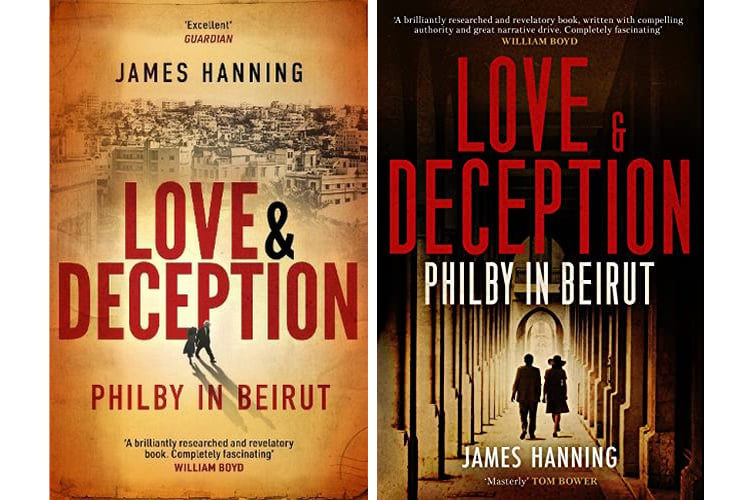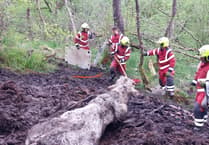A former journalist near Hay-on-Wye this week launched the paperback edition of his latest book about the Cambridge Five’s Kim Philby.
Originally released at the end of August last year, James Hanning is behind Love and Deception: Philby in Beirut - the non-fiction romance spy thriller which is from the perspective of Infamous double agent Philby’s American wife, Eleanor Brewer.
Mr Hanning, who lives just outside the town of books with his wife and two children, said the factual biography looks at the Cambridge spies.
He said: “They were five students at Cambridge in the 1930s and they were signed up to work secretly for the Russians because they felt that the West wasn’t doing enough to challenge fascism.
“They effectively betrayed their own country and a lot of people were sent to their deaths as a result of what they did. My book really is about the last period of Philby’s life in the west before he was exposed so it’s meant to be a bit of a thriller as it were.”
Mr Hanning, who was previously the deputy editor of the Independent on Sunday, explained that his book is a “sort of half spy story and half love story” set in the 1950s which is when Philby fell “madly in love” with Eleanor in Beirut, the capital city of Lebanon.
The 65-year-old said that his inspiration behind the successful new book came from a friend and former colleague who had known one of the Cambridge Five spy ring.
He said: “I worked with somebody called Brian Sewell, who is a famous art critic, who was a friend of one of the Cambridge spies, a chap called Anthony Blunt.
“He was taught by Anthony Blunt who was later revealed as a traitor.
“I had always been very interested in this, and they are very famous and notorious chapter in British post-war history.
“The fact that we had these five traitors all working at a very high level of the British establishment who were all secretly working for Moscow.”
The five double agents were part of the spy ring from the 1930s until around the 1950s - despite being exposed, none of the known members were prosecuted for espionage crimes.
However their exposure caused outrage across the UK when it hit the news as different members were exposed.
The Cambridge Five members were made up of Harold ‘Kim’ Philby, Anthony Blunt, Donald Maclean, Guy Burgess and John Cairncross.
While other members were alleged, they were never proved or named.
Mr Hanning described Blunt, who was exposed in 1979, was a “very famous academic art historian”.
He said: “He was a very, very famous academic art historian. He was working, he worked at Buckingham Palace - he looked after the Queen’s pictures. He was an academic and he taught a man called Brian Sewell and he, Brian Sewell was a colleague of mine on a newspaper in London and Brian Sewell told me some fascinating things that had never been made public after Anthony Blunt was exposed as a spy.
“Anthony Blunt was Sir Anthony Blunt and he had his knighthood taken off him because of what he’d done, and he has a role in the story about Philby - Philby was a great friend of Blunt.”
Kim Philby fled to Moscow from the UK in May 1951 after suspicions started to rise.
He was exonerated in 1955 and returned to Beirut as a journalist and SIS agent, however he was exposed as a Soviet agent in 1963 which is when he defected back to Moscow where he lived until his death in 1988.
“When he was living in Beirut, he returned to his original career as a journalist and he was working Beirut as a journalist for the Observer newspaper and economist.
“They were off out to dinner with some colleagues and he rang his wife and he said ‘oh, I’m terribly sorry darling, I’m going to be a bit late. I’ve been held up at work. You go on ahead and I’ll see you there’. To which she went ‘oh yeah, fine, yeah’ and she went along to the dinner party and she said to the host ‘I’m sorry, he’s going to be a bit late’.
“He was very late, and very late and he got later, and later and later and they said ‘oh, you know what he’s like. He’s probably drunk somewhere or being held up or got distracted or delayed or whatever. You know what it is with journalism’ but she said ‘no, no - he’s never done this before, this is extraordinary’.
“Everybody know he was a hell of a drinker, but he’d never actually not turned up somewhere - 11 o’clock came, 12 o’clock came and he didn’t turn up, and he completely disappeared.“

Mr Hanning, who previously also spent time living in Italy, revealed that the reason he had not arrived at the dinner party was he had in fact taken a boat to Russia.
He said: “The reason he disappeared was that he’d got on a boat to go to Russia, and she had absolutely no idea, and it’s the most extraordinary human story. A colleague came round said, you must remember your husband was no ordinary man. And she said ‘what do you mean “was”? What are you talking about?
“He [the colleague] suspected that’ he’d gone to Moscow but he didn’t know for sure.”
Mr Hanning described Eleanor as “completely amazed and bowled over” as she’d had no idea about his second life.
The pinnacle of the thriller is Eleanor’s dilemma about whether she will join Philby in Moscow.
The writer said: “That was an absolutely shattering blow to her obviously and he wasn’t, he’d gone to Russia but he wasn’t allowed to say where he was as the Russians had told him he couldn’t say anything.
“He wrote to her and said ‘look, I’m not allowed to say anything but please will you follow me, come and join me in Moscow’.
“The book is about all that, and whether she was going to go with him to Moscow or not and so it’s partly about the spies and partly just about the human story of ‘how well do you know your partner really’?
“It’s a bit of a universal story of how can you do something to somebody like that? As I say, she had absolutely no idea that he had done this and that he was going to do this out of conviction.
“She had days and days, and then weeks of thinking ‘well where is he?’ And then the press got really interested and they were coming round and she didn’t know anything about where he was or anything like that. It is just extraordinary.”
Mr Hanning, who enjoy the work of spy novelists like John le Carre, said he wanted to show that spy genre could be “human” rather than just lots of men.
He said: “A lot of that sort of world is very male-dominated, it’s a lot of older men and it’s men, men, and more men because traditionally it’s a sort of male area.
“ Especially where literature is concerned, it’s a male area. I love all of that stuff, but some of them are human stories and why should women not want to read them? I just don’t to get it.
“This story about Philby and his American wife, he actually married four times in the end, but to my mind Eleanor was the love of his life.
“That’s the fascination, there’s an amazing human story here - they were madly in love with each other, and yet he put his political beliefs above even that and that’s a fascinating human thing”.
Mr Hanning, who is now a full time author near Hay, has also written a book on the phone-hacking scandal from the 2010s and he co-wrote a book on former Prime Minister David Cameron before his time in office - including almost being kicked out of Eton for drugs.
While the official details are yet to be announced, Mr Hanning will be doing a talk about Love and Deception: Philby in Beirut at this year’s Hay Festival on May 31.
Note: In the print edition, we referred to the book as a biographic novel. It is a purely non-fiction account and we apologise for any confusion caused.





Comments
This article has no comments yet. Be the first to leave a comment.